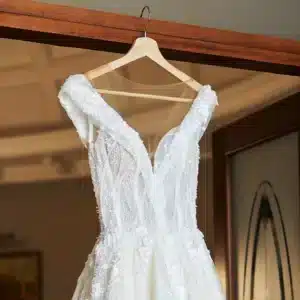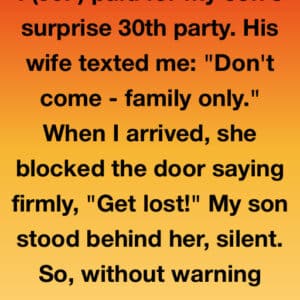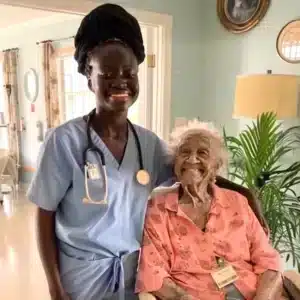I don’t usually tell strangers about my in-laws, but two weeks ago I fell through a chair at my MIL’s birthday—and the splintering wood wasn’t the worst part.
I’m Elena, 35, married to Nick, 36. We live outside Asheville. He’s a systems engineer, I write from home, and his mother Laura is… a capital-letters Personality. The kind of woman who corrects you if you forget the hyphen in “Garrison-Peters.”
For her sixty-third, she “invited” us to dinner by informing Nick we’d be supplying food and drinks because “the birthday girl shouldn’t lift a finger.” She also requested a custom lemon-lavender cake from a boutique bakery. We showed up with that, three casseroles, a cooler, and a joint gift—an on-sale 55″ Samsung from us, Nick’s sister Dani, and her fiancé, Marcus.
Laura opened the door, glanced at the cake, then eyed the TV box. “Oh. I thought you were getting me the 110-inch. I guess this’ll do.”
I pasted on a smile. Nick squeezed my back: Just breathe.
Inside, I clocked the table. Every place had a printed name card in calligraphy. It felt less like a family dinner and more like a coronation. I found my spot across from Nick, next to Uncle Carl (who once described his spinal surgery while I carved turkey).
Laura made a point of walking me to my chair—an old wooden number that looked hauled from someone’s attic. “This was my grandma’s,” she announced. “Solid cherry. Worth a small fortune. I wanted you to sit in it, sweetie. I know how you love antiques.”
I don’t. IKEA is my love language. But I sat.
The chair moaned, then gave out like someone kicked its knees. I hit the floor. Pain shot up my spine, embarrassment flooded my face, and time slowed to the sound of clinking cutlery.
Laura laughed. “Well! Guess we learned what kind of weight that old chair can’t handle.” Another cackle. “Maybe portion control, honey. We can’t have all our furniture ending up like that.”
I forced a shaky, “I’m okay.”
She wasn’t done. “That chair was worth eight hundred. But I’ll only ask five hundred since it was a gift to have you here. You break it, you buy it.”
I looked at Nick. His mouth opened… and closed. Dani studied her wine. Marcus went mute. Uncle Carl found God in his salad.
Then George—my quiet father-in-law—stood. No table-pound, no yell. Just a steady rise.
“Laura,” he said, voice like glass, “do you really want me to tell everyone the truth about that chair?”
Her smile twitched. “What are you talking about?”
He turned to the table. “She bought it at Goodwill last week. I was with her. Twenty-two dollars. The back leg was already cracked when we loaded it. She looked at me and said, ‘It’ll work for what I need it for.’”
Silence threaded the room.
“I watched her in the garage with a screwdriver, ‘fixing’ it,” he went on. “She wasn’t fixing it. She was loosening it. I didn’t think she’d actually go through with it. But then she made the seating chart… and put Elena there on purpose.”
A ripple of gasps and head shakes. Dani’s jaw dropped. Uncle Carl finally stopped chewing.
My voice barely cleared my throat. “You wanted to humiliate me?”
Laura’s eyes flicked everywhere, then hardened. “You’ve always made yourself the victim. You swan around like you’re better than us. I just wanted to prove a point.”
“What point?” I asked. “That you can orchestrate a pratfall?”
“That’s enough,” George snapped, louder now. “You want attention? Congratulations. You got it.”
For the first time that evening, Laura looked small. She scanned faces for an ally and found none.
Nick stood beside me. His voice was quiet but firm. “El, grab your purse. We’re leaving.”
We walked out. Behind us, George said, clear as a bell, “And Laura? Don’t bother coming home tonight. I’ll have your things boxed up.”
The drive was silent, headlights stretching across an empty road. At home, I sat on the edge of our bed; Nick hovered in the doorway.
“She’s always been difficult,” he said. “But this… I didn’t know she’d go that far.”
“Why didn’t you say anything?” I asked. “When she joked about my weight? When she demanded money?”
He swallowed. “I freeze with her. Keep the peace.” He shook his head. “There’s no peace in that. You’re right. I should’ve stood up for you years ago. I’m sorry.”
The next morning, George texted a photo of the chair in two pieces. Taped to the leg: a Goodwill receipt—$22. “If I’d known, I would’ve stopped it,” he wrote. “You didn’t deserve that. I’m sorry.”
He invited just us over for dinner later that week. No place cards. No performance. He served spaghetti and meatballs—his one recipe—and said, “She’s been controlling a long time. I thought staying quiet was the right thing. I was wrong.” He looked at me. “You broke more than a chair, Elena. You broke the cycle.”
Laura moved in with a friend “until things calm down,” which translates to “until someone else feeds the drama.” She sent me a few texts: “Hope you’re happy tearing a family apart over a chair.” I blocked her. She tried rewriting the story to extended family—George “humiliated” her, I’m “dramatic,” the collapse was “an accident.” No one bought it. Even Uncle Carl messaged: “We all saw. You handled it with grace.”
Nick and I started therapy. We’re learning about boundaries, about how silence can be complicity, about how his mother’s behavior seeped into our marriage. He’s showing up differently—less apology by promise, more by action. We agreed on no contact with Laura for now; any future contact will be on our terms.
I still think about the moment on the floor, cheeks burning while a room full of people watched. But I also replay George standing like a quiet tide, choosing truth over comfort. It wasn’t his volume that made him powerful. It was the refusal to collude.
As for the $500? Laura never saw a dime.
She lost more than a fake antique that night. She lost the script she’d been directing for years.





